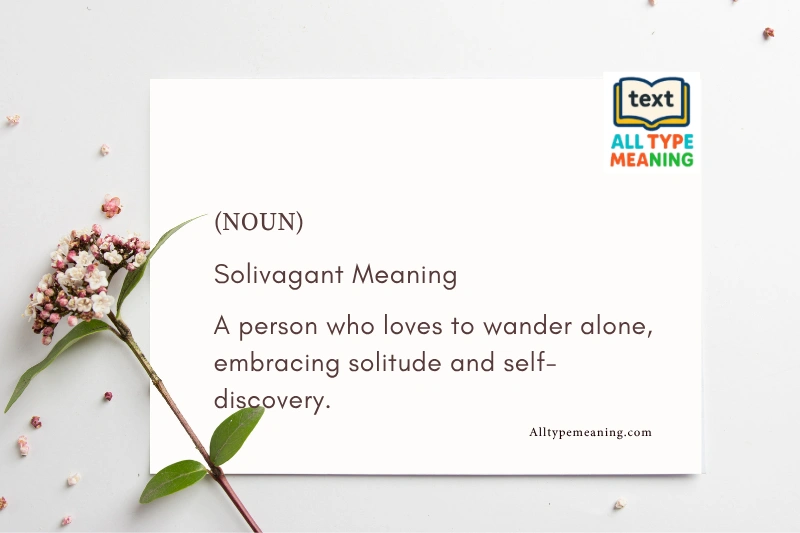The Solivagant meaning refers to someone who loves to wander alone, exploring the world with a free and curious spirit. It’s a beautiful word that captures the essence of independence, peace, and self-discovery. In today’s busy world, being a solivagant reminds us to enjoy solitude and adventure at our own pace. Understanding this word helps students, professionals, and language lovers enrich their vocabulary and express emotions more deeply. Let’s dive in to explore the complete meaning, origin, and inspiring usage of this fascinating word!
Quick Stats Table
| Aspect | Details |
|---|---|
| Word | Solivagant |
| Part of Speech | Adjective / Noun |
| Origin | Latin (solus + vagant) |
| First Known Use | Early 20th century |
| Pronunciation | so-LIV-uh-gant |
| Popularity | Rare but trending on social media |
| Common Usage | Literature, travel blogs, poetry |
| Difficulty Level | Advanced vocabulary |
Word Definition: What Does Solivagant Mean?
Solivagant (adjective/noun) refers to a person who wanders or travels alone, especially without a fixed destination or purpose. It describes someone who finds joy, peace, and meaning in solo exploration and solitary journeys.
Grammatical Overview
Part of Speech: Primarily used as an adjective, but can also function as a noun
Pronunciation:
- Phonetic Spelling: so-LIV-uh-gant
- IPA: /səˈlɪvəɡənt/ or /ˌsoʊˈlɪvəɡənt/
Usage Forms:
- As an adjective: “She has a solivagant soul.”
- As a noun: “He is a true solivagant.”
The word carries a poetic, almost romantic quality, making it popular among writers and those who appreciate the beauty of wandering alone. It’s not just about physical travel – it can also describe someone’s independent, free-spirited nature.
Origin & Etymology: Where Did Solivagant Come From?
The word solivagant meaning has beautiful Latin roots that perfectly explain its meaning:
Latin Components:
- “Solus” = alone, solitary
- “Vagant” = wandering (from “vagari” meaning to wander)
The term emerged in the early 20th century in English literature, though it never became mainstream. Writers and poets adopted it because it captured something that no other single English word could express – the unique experience of purposeful solo wandering.
Historical Context: Unlike simple words like “traveler” or “wanderer,” solivagant specifically emphasizes the solitary nature of the journey. It gained renewed popularity in the 2010s through social media platforms like Tumblr and Instagram, where travel and self-discovery content flourished. Today, it’s especially beloved by Generation Z and Millennials who embrace solo travel and self-exploration.
Detailed Usage: How to Use Solivagant Correctly
Understanding the nuances of Solivagant meaning helps you use it perfectly in writing and conversation. Here’s a detailed breakdown:
Different Contexts & Senses:
1. Physical Travel Context:
- Describes someone who prefers traveling alone
- Emphasizes wandering without strict plans
- Example: “As a solivagant traveler, she explored hidden villages.”
2. Philosophical/Personality Context:
- Describes someone’s independent nature
- Reflects a preference for solitude and self-discovery
- Example: “His solivagant spirit made him uncomfortable in group settings.”
3. Literary/Poetic Context:
- Used to create atmosphere or describe characters
- Adds depth and emotion to descriptions
- Example: “The solivagant poet wandered through moonlit streets.”
Grammar Notes & Collocations:
Common Collocations:
- Solivagant soul 🌙
- Solivagant person
- Solivagant spirit
- Solivagant nature
- Solivagant journey
- Solivagant wanderer
Typical Sentence Patterns:
- “She is/was a solivagant…”
- “He has a solivagant soul/nature…”
- “The solivagant [noun]…”
- “To be solivagant means…”
Important Note: Solivagant is a literary/formal word. It’s perfect for creative writing, blogs, and academic contexts but might sound too formal in everyday casual conversation.
Synonyms & Antonyms: Similar and Opposite Words
Synonyms
| Word | Meaning |
|---|---|
| Lone wanderer | A person who travels or roams alone |
| Solo traveler | Someone who journeys without companions |
| Solitary explorer | An individual who explores places in isolation |
| Peripatetic | A person who travels from place to place |
| Wayfarer | A traveler, especially one who travels on foot |
| Vagabond | A wanderer with no fixed home or destination |
| Nomad | A person who moves from place to place |
| Drifter | Someone who moves aimlessly from place to place |
| Recluse | A person who lives in solitude or seclusion |
| Free spirit | Someone who is independent and unconstrained |
Antonyms
| Word | Meaning |
|---|---|
| Homebody | A person who prefers staying at home |
| Socialite | Someone who loves social gatherings and company |
| Companion | A person who accompanies others |
| Group traveler | Someone who travels with others |
| Settler | A person who establishes a permanent home |
| Stay-at-home | Someone who rarely travels or ventures out |
| Gregarious person | An individual who enjoys company and social interaction |
| Team player | Someone who prefers working/being with groups |
| Stationary person | Someone who doesn’t move around much |
| Community-oriented | Focused on group activities and togetherness |
Words That Look Similar (But Mean Different Things!)
Solivagant vs. Similar-Looking Words:
- Vagrant – A homeless person who wanders; has negative connotations
- Extravagant – Excessive or elaborate; completely unrelated meaning
- Solvent – Able to dissolve substances or pay debts; different root
- Relevant – Connected or applicable; no relation to wandering
Don’t confuse these! Solivagant specifically means a person who wanders alone by choice, not someone who is homeless or lost.
Example Sentences: See Solivagant in Action
Here are seven diverse examples showing how to use solivagant in different contexts:
- Travel Context: “After her breakup, Maria became a solivagant, backpacking through Southeast Asia with just her thoughts and a camera.”
- Personality Description: “His solivagant nature was evident from childhood – he preferred solo bike rides to crowded playgrounds.”
- Literary Usage: “The novel’s protagonist was a solivagant soul, finding meaning in empty train stations and forgotten roads.”
- Philosophical Context: “In today’s hyper-connected world, being solivagant is an act of courage and self-discovery.”
- Social Media Caption: “Embracing my solivagant spirit this weekend – just me, my hiking boots, and the mountains! #SoloTravel”
- Character Description: “Unlike her extroverted sister, Priya was solivagant, spending summers exploring museums and cafes alone.”
- Poetic Usage: “The solivagant moon wandered across the night sky, keeping company with stars alone.”
Common Mistakes & Tips to Avoid Them
Typical Errors:
1. Spelling Mistakes:
- ❌ Solovagant (wrong)
- ❌ Solivagent (wrong)
- ✅ Solivagant (correct)
2. Pronunciation Errors:
- Many people stress the wrong syllable
- Remember: so-LIV-uh-gant (stress on “LIV”)
3. Usage Mistakes:
- ❌ “I’m going solivagant” (wrong – it’s not a verb)
- ✅ “I’m a solivagant” or “I have a solivagant nature” (correct)
4. Context Errors:
- Don’t use it for forced loneliness or negative isolation
- Solivagant implies chosen solitude, not loneliness
Pro Tips to Remember:
✅ Think: “SOLItary” + “VAGrant” = someone who wanders alone ✅ Use it for positive, purposeful solo wandering ✅ Perfect for Instagram captions, poetry, and creative writing ✅ Don’t overuse – it’s a rare, special word that loses impact with repetition
Cultural & Contextual Insight: Why Solivagant Matters Today
Literary Significance:
Solivagant has appeared in modern poetry and indie literature, often symbolizing:
- Self-discovery journeys
- Freedom from societal expectations
- The romance of solo travel
- Mindfulness and presence
Modern Relevance:
In the 2020s, solivagant has become particularly meaningful because:
- Solo Travel Boom: More people (especially women) are traveling alone for empowerment
- Mental Health Awareness: Solo time is recognized as important for well-being
- Digital Nomad Culture: Remote work enables the solivagant lifestyle
- Social Media Aesthetics: The word perfectly captures #wanderlust culture
Regional & Cultural Notes:
- In Hindi: सोलीवेगेंट (Solivagant) – अकेले भ्रमण करने वाला
- In Tamil: தனியாகப் பயணம் செய்பவர் (Thaniyāka Payanam Seypavar)
- In Telugu: ఒంటరిగా సంచరించే వ్యక్తి (Oṇṭariga Sañcarin̄cē Vyakti)
- In Marathi: एकटे भटकणारे (Ekeṭe Bhaṭakaṇāre)
The concept exists across cultures, though the specific English word is unique!
Tips to Remember & Learn This Word
Memory Tricks:
- Break it down: SOLI (solo) + VAG (vagrant/wander) + ANT (person)
- Visual Association: Picture an ant walking alone on a path
- Story Method: “Sally Only Loves Independent Voyages And Goes Alone, No Team”
- Use it: Post it as your Instagram bio or travel journal title
Practice Exercise:
Try creating your own sentence using solivagant! Think about:
- A person you know who loves solo adventures
- Your own travel dreams
- A character in a story
Related Words & Word Family
Words with Similar Roots:
- Solitary – alone, single
- Solitude – the state of being alone
- Vagrant – wandering person
- Vagabond – wanderer without fixed home
- Vagary – unpredictable wandering or change
Related Travel & Wanderer Terms:
- Wanderlust – strong desire to travel
- Fernweh (German) – feeling of wanting to be somewhere else
- Sonder – realization that everyone has a complex life
- Flâneur (French) – leisurely wanderer observing urban life
Reader Interaction: Are You a Solivagant?
Discover Your Wanderer Type:
Ask yourself these questions:
- Do you prefer traveling alone over group trips?
- Do you enjoy discovering places without strict itineraries?
- Does solitude energize rather than drain you?
- Do you find clarity and peace in solo adventures?
If you answered YES to 3-4: You’re definitely solivagant!
Share your story: Have you ever had a solivagant experience? Tell us in the comments below! We’d love to hear about your solo wandering adventures!
Tag a solivagant friend who needs to see this article!
Related Expressions & Modern Usage
Social Media Slang Evolution:
Solivagant has inspired related hashtags and phrases:
- #SolivagantSoul (150K+ posts on Instagram)
- #SolivagantLife
- #SolivagantSpirit
- “Feeling solivagant today” (trending phrase)
In Popular Culture:
- Featured in aesthetic quote accounts
- Used in travel blog titles
- Appearing in indie song lyrics
- Popular in self-help and mindfulness content
Modern Variations:
- “Digital solivagant” – someone who explores the internet alone
- “Urban solivagant” – city wanderer
- “Solivagant mindset” – independent thinking approach
Conclusion:
Frequently Asked Questions
1. Is solivagant a real English word?
Yes! Solivagant is a legitimate English word with Latin origins, though it’s rare and literary. It’s gaining popularity through social media and travel communities.
2. Is solivagant formal or informal?
Solivagant is a formal/literary word perfect for creative writing, poetry, and blogs. For casual conversations, use “solo traveler” instead. On social media, it’s widely accepted!
3. What’s the difference between solivagant and lonely?
Solivagant means chosen solitude – positive and empowering. Lonely means feeling sad about being alone – negative and unwanted. You can be solivagant without being lonely!
4. Can solivagant be used as a verb?
No, solivagant is not a verb. Use it as an adjective or noun only.
- “I am a solivagant”
- “I’m going to solivagant”
5. How do you pronounce solivagant correctly?
The correct pronunciation is so-LIV-uh-gant with stress on “LIV”. Think: so-LIVE-uh-gant. Practice it a few times!
Get the complete explanation of ADHF full form in medical at All Type Full Form.

